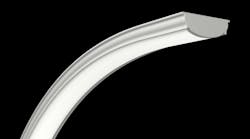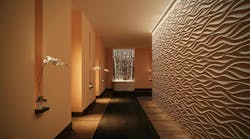Date Announced: 23 Feb 2012 MCLR has commissioned the first Russian-based production of substrates and panels for electronic devices. Its factory in Vladimir will manufacture the components primarily for LEDs requiring heat sinks. The new plant’s entry into production is a significant step in the partnership between RUSNANO and an Israeli high-tech company with direct input from a venture capital fund created by Russian Venture Company.RUSNANO, Tamir Fishman CIG (a venture capital fund established with RVC’s participation and operating under the management of Innovation Solutions), and Micro Components Ltd. (the Israeli technology developer) are partners in the project. Total budget for the project is 868 million rubles. Of that sum, RUSNANO is cofinancing 120 million rubles.The project is based on MCL’s patented technology ALOX™. Substrates manufactured with this technology are made of two main parts, an aluminum or copper conducting layer and a dielectric material with nanopourous structure. The dielectric material creates the considerable competitive advantage of these substrate over those made with traditional technology.In its first phase of operations, the Vladimir factory will produce 10,000 panels per month. This volume is enough to make more than one million LED lamps. By 2015 the factory is expected to reach design capacity of 70,000 panels per month with company earnings at 2.8 million rubles annually. Substrates for assembly of electronic devices are forecast to account for 72 percent of earnings in 2015. LED modules will make up the remaining 28 percent. Production at that level will give MCLR between 2 percent and 4 percent of the global market for these components.The substrates produced with ALOX™ technology have passed all necessary tests, including tests for thermal reliability. MCLR’s products outstrip alternatives on basic consumer characteristics—heat conductivity, by hundreds of times; price, by 20 percent to 30 percent; reliability, twofold. Presently leading international players in the LED market are considering using the company's products.“We believe that manufacturing operations plus the ambitious plans shared by project participants will enable MCLR to become one of the largest manufacturers of nanostructured substrates and other electronic devices using our technology in the Russian and global LED markets,” said MCL founder and CEO Uri Mirsky.“Entering production shows that we have gotten a wonderful start in our collaboration with Israel, one of the world’s centers of innovation. By using technology that has already proven itself, we are helping to ensure that the growing Russian market for LEDs has high-quality components, surpassing analogs on price-quality measures,” noted RUSNANO Senior Investment Manager and Chairman of the Board of Directors of MCLR Vasily Kostyanovsky.“MCLR is a joint project of venture capital fund Tamir Fishman CIG, created with RVC’s participation, Israeli innovator MCL, and RUSNANO. The company is a striking example of how the latest foreign technology may be used to establish large-scale commercial manufacturing in Russia, producing high-technology goods for the entire world. The opening of the plant in Vladimir is an important step in the project’s growth. Through close cooperation with RUSNANO and MCL, we were able to go from initial financing to commercial production in only 14 months,” said Yan Ryazantsev, director of the Investment and Expertise Department and member of the Executive Committee, Russian Venture Company.“I would like to add that when backplane assemblies are produced with ALOX™ technology, we obtain a product that can be recycled, whereas traditional printed boards of glass textolite cannot. Our products not only have unique capabilities, they are also environmentally safe,” MCLR General Director Mikhail Naish explained.Technical InformationLED lamps have substantial advantages in comparison with traditional light sources. But they also have a basic problem: The crystal that radiates light heats significantly when lit. With rising temperature, the crystal gives off less light, and the service life of the LED lamp is shortened.Israeli company Micro Components Ltd. was able to resolve this problem with its ALOX technology, which lowers the temperature of the crystal with rapid heat sink. At the heart of the technology is a process of selectively staged aluminum oxidation in which dielectric material is obtained on the surface of the metal and in its depths. MCL was the first company in the world to form a structure of insulating conductors inside the metal while obtaining an oxide. MCL’s approach resulted in a new type of inexpensive backplane with high heat conductivity.Drilling and plating of perforations are not required with ALOX™ because the interconnections are made entirely of aluminum and the dielectric material is made of high-quality ceramic material. The process is simple, low cost, and requires a limited number of operations.ALOX™ is a broad technological platform that can be applied in packaging various electronic goods: microwave electronics, SiP (system-in-package) technology, three-dimensional memory stacks, MEMS devices, and powerful modules and components.RUSNANORUSNANO was founded in March 2011 as an open joint stock company through reorganization of state corporation Russian Corporation of Nanotechnologies. RUSNANO’s mission is to develop the Russian nanotechnology industry through co-investment in nanotechnology projects with substantial economic potential or social benefit. The Government of the Russian Federation owns 100 percent of the shares in RUSNANO. Anatoly Chubais is CEO and chairman of the Executive Board of RUSNANO.Work to establish nanotechnology infrastructure and training for nanotechnology specialists, formerly conducted by the Russian Corporation of Nanotechnologies, has been entrusted to the Fund for Infrastructure and Educational Programs, a non-commercial fund also established through reorganization of the Russian Corporation of Nanotechnologies.Russian Venture Company is a state fund of funds, an institute for development of the Russian Federation, and one of the government’s key instruments in its effort to build a national innovation system. RVC has more than 30 billion rubles in equity. The Russian Federation owns 100 percent of RVC through the Federal Agency for State Property Management (Rosimushchestvo).To date, RVC has formed 12 funds whose aggregate worth is 26.1 billion rubles. RVC holds interest of 16 billion rubles in these funds. The company has already invested in 104 innovative companies. In sum, it has invested 9.2 billion rubles.
Contact
RUSNANO
Web Site:www.rusnano.com/Post.aspx/Show/33858




